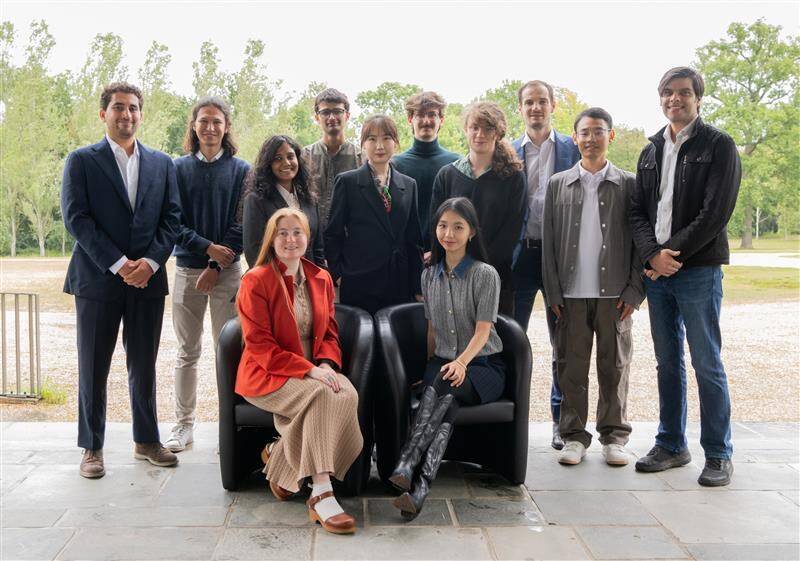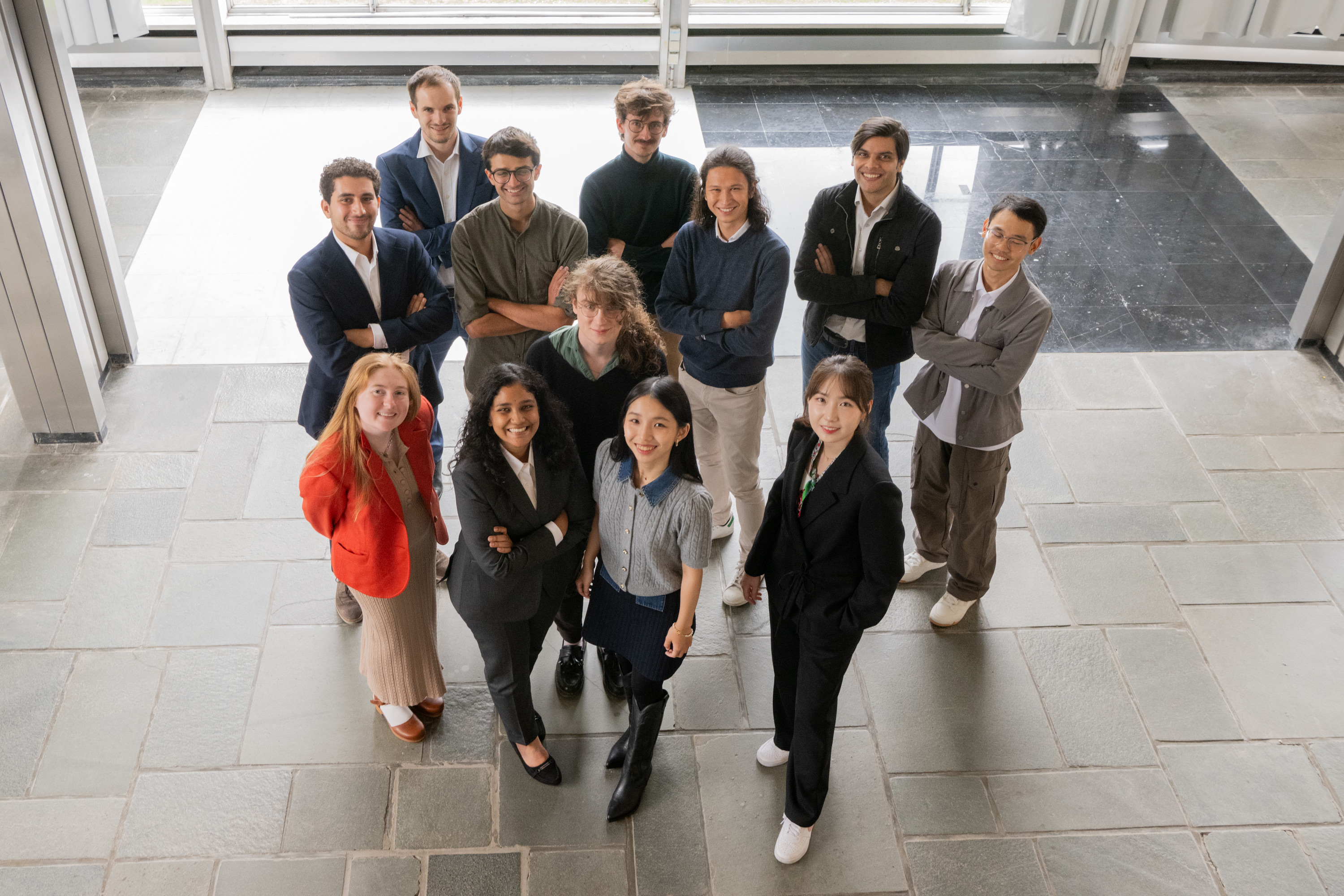12 New PhD Students Poised to Ask the Big Questions
12 doctoral students joined the HEC Paris PhD Program this fall, selected from an exceptionally competitive pool. They expand the school’s tightknit research community.

Key Findings
- A dozen doctoral candidates join the PhD community, representing 6% of applicants. It brings the numbers up to 56 students from 21 nationalities, with almost perfect parity.
- The new students tackle AI/digital governance, climate/energy, inequality/development, finance/financial stability, and health.
- Many combine machine learning, econometrics, and experimental methods, signaling a cohort that is both technically rigorous and interdisciplinary.
- Several arrive with publications, R&Ds, and policy or consulting experience, ensuring that their work is grounded in both theory and practice.
- The cohort will once again benefit from HEC’s tight-knit, international doctoral community and partnerships with HI! PARIS, the S&O Institute, and global research networks.
Research as a Social Enterprise
At HEC Paris, the doctoral program is not just about training scholars; it’s about nurturing curious minds who see academia as a stage for impact. This fall, 12 new PhD students arrived with, in their suitcases, strong backgrounds, bold research agendas, and a shared ambition: to shape how society understands, and responds to, critical global challenges. As American writer Suzanne Braun Levine once noted: “The best doctoral students are not those who have all the answers, but those unafraid to ask the hard questions.”
But doctoral studies are also a joint effort between student and faculty. As the Dean of Faculty and Research Andrea Masini, reminded the incoming class at September’s Welcome Week: “Research is a social enterprise. Curiosity, rigor, and collaboration with faculty and peers will be your compass.” His words captured both the spirit and the diversity of this year’s cohort, reflecting global debates on AI regulation, sustainable finance, inequality, and corporate purpose.
Anchored in Excellence: HEC’s PhD Community
Before delving into the newcomers, it helps to remind readers where they are joining. The HEC PhD Program is a selective, full-time commitment designed to prepare students for academic careers. It spans five years (two years of rigorous coursework and three years focused on dissertation), except in Law & Regulation, which has a direct three-year track. Courses range from econometrics and statistics to qualitative methods, machine learning, experimental design, and more. Students are expected not only to master methods but to publish, network, present, and become visible players in their fields.
As of this year, the doctoral community at large comprises about 65 students, with 42% women, 82% from outside France, and representation from nearly 20 nationalities. The small size (10-12 new PhDs annually, with only 1-4 in each specialization) is intentional: it means close supervision, tight cohorts, and rich peer interaction.
The New Cohort: Tendencies, Research, Unusual Highlights
This year’s 12 students bring both continuity with HEC’s strengths and some novel inflections. We’ve identified the major thematic clusters as AI & Digital Governance, Inequality/Development, Climate/Energy, Finance/Financial Stability, and Health. Here are the main interests:
- Economics and Decision Sciences enjoys the fresh approach of three new students, some of whom carry dual affinities for economics, machine learning, data science, and experimental/field methods. This reflects HEC’s ongoing emphasis on combining rigorous methods with impact.
- AI & Digital Governance feels like this year’s gravitational center. Whether through algorithmic fairness, platform regulation, or applications in health, multiple candidates are anchoring their proposals on how technologies shape-and must be shaped by-society.
- In parallel, the scholars’ approach to inequality/development and climate/energy themes comes through strongly. HEC’s doctoral training are increasingly becoming forums for scholars who want their work to inform policy directly. These include topics like climate transition risks, finance in developing economies, and wealth and educational inequalities.
- More doctoral students are arriving with research experience already under their belt. This combines with industry, policy, or consulting experience. Their networks, perspectives, and often data access extend well beyond academia.
Portraits of Promise
While all 12 are impressive, a few profiles caught attention:
- Eunha Cho (South Korea) engages with major institutions like the OECD and national policymaking in Korea to study the innovation, taxation, and inequality-areas central to debates over global redistribution.
- Shashank Shaurya Dubey (India) has already published around virality and platform regulation. His research is not only theoretically interesting but critically timely as we consider AI, misinformation, and digital platforms’ social power.
- Hugo Etchegoyhen (France): multidisciplinary, with strong commitment to sustainability and urban/climate intersectionality-his kind of research can help bridge academic rigor and societal urgency.
- Gabriella Jakubczak (USA) offers something less common: anthropology. The American combines management with cross-cultural fieldwork. Her ability to move among contexts (Europe, Japan) and methods (qualitative combined with survey) is rare and gives her work potential depth and reach.
From Computer Science in Arts to Helping Diabetic Patients
This in no way diminishes the importance of the doctoral initiatives from the eight other scholars. A quick breakdown:
- Ali Benramdane (Morocco) focuses on applied economics, with experience in sovereign advisory, advising governments on optimal financial and economic strategies. He studied at Sciences Po and Columbia University, and is interested in studying the intersection between finance and development, focusing on issues linked to sovereign debt and climate finance.
- Mathieu Fantino (France) exemplifies the sustainability-finance nexus, blending data science, organizational research, and policy analysis. His past leadership in student ecological initiatives highlights a drive to connect academia with civic responsibility.
- Alessandro Riva (Italy) brings expertise in urban and spatial economics, looking at how demographic change reshapes housing markets and city life.
- Yuan Li (China) stands out as a data scientist with projects on AI applications in health, including remote monitoring tools for diabetic patients.
- Venkata Aparna Poodipeddi (India), a Chartered Accountant and former EY consultant, now turns to research on insider trading and algorithmic market anomalies, bridging regulation, finance, and data analytics.
- Thomas Tressel (France), educated at Oxford and Berkeley, focuses on geoeconomics and rural development, with a keen eye on infrastructure and spatial policy.
- Jianing Zhao (China/Netherlands) combines computer science and the arts, applying machine learning to healthcare and simulation research.
- Lucie Bois (France/Canada) enters the Finance Department with an unusual trajectory: from developing a literature review tool powered by AI, to research on litigations involving a non-compete agreement. Her approach reflects a blend of practice and academic curiosity.
Reaching Beyond the School’s Silos
All in all, this cohort is more “global in practice” than ever. Several students are affiliated with several departments or research centers linked to the school. That enriches the common culture: seminars, peer feedback, joint research. They share several traits such as an ability to blend data science and AI tools with traditional economics and causal inference is stronger than usual. The doctoral students are choosing more than one method to nourish their research by combining machine learning with experimental or econometric design.
While the Law & Regulation specialization sits empty this year, regulatory themes are alive. Many students in the other departments are effectively entering legal or policy spaces via digital regulation or financial regulation. That suggests an informal widening of disciplinary boundaries.
Finally, the publication and experience signals are strong. It’s not just potential-it’s some tangible achievement already: awards, R&Rs, first publications, consulting work, policy brief contributions.
Part of a Global Ecosystem
HEC’s PhD program has, over its relatively small but deeply committed community, placed students in faculty positions globally; it's part of an ecosystem, not an isolated enclave. The doctoral program works in partnership with centers like HI! PARIS (digital transformation), S Sustainability & Organizations Institute (S&O), and others. Thus, doctoral themes are not alien to urgent social concerns.
The newest cohort arrives amid two striking global forces. On the one hand, the acceleration of technological disruption - AI, automations, platform economies - calls for scholars who can understand, critique, regulate, and guide them. On the other, there is growing pressure for academia to do more than observe, to offer solutions, inform regulators, and contribute to sustainable transitions. The mix of method, exposure, and topics in this cohort suggests that these students don’t only want to publish, they want to contribute.
The tight structure of the program - two years of intensive foundational coursework, followed by dissertation work, with constant interaction - sets the stage not just for academic visibility, but for real world societal impact. To borrow the words of the 19th century philosopher and educator Abraham Flexner: “Institutions of higher learning should be devoted to the cultivation of curiosity, for curiosity lies at the root of all progress.”
